Contents
- 1. According to psychology
- 2. According to the science of Spirituality
- 2.1 According to the Path of Devotion (Bhaktiyoga)
- 2.2 According to the Path of Action (Karmayoga)
- 2.3 According to the Path of Knowledge (Dnyanyoga)
- 2.4 According to the Path of Activation of Spiritual Energy (Kundaliniyoga)
- 2.5 According to science of frequencies (spandanshastra)
- 2.6 Concept of happiness and unhappiness according to various paths of Yoga
Causes of happiness and unhappiness
1. According to psychology
A. Restlessness (no peace of mind): ‘अशांतस्य कुत: सुखम् ।’ means how will a restless soul find happiness?
B. ‘Worrying nature’ as a defect in personality: The following example illustrates how a person with a worrying nature can become unhappy even after knowing the prediction of future happiness. A woman was worried about the future of her 15 year old son and 11 year old daughter. In order to get rid of her anxiety, she was told that her son’s life would be thrice and her daughter’s twice as happy as an average person and that they would be educated abroad, would be well-off, the daughter’s in-laws would be good, etc. After she was told all this she felt better for a short while, but soon became depressed. When she was asked the reason for feeling sad she replied, “I do not have to do anything for my children. They are going to be happy by their own destiny, thus I will not get the satisfaction of doing something for my children and shaping their lives. Because of this feeling I have developed this void within me and am feeling very sad.”
C. Many a times there occurs a conflict among the tongue, mind and intellect, whether to eat a tasty dish or not and consequently psychological stress is generated. If there is a harmonious co-ordination between the body, sense organs, mind, intellect and the soul then one will enjoy good health and happiness. However if this is not so, it will result in illness and unhappiness.
D. सर्वं परवशं दु:खं सर्वमात्मवशं सुखम् । – मनुस्मृति
Implied meaning: Dependence itself is unhappiness and independence is happiness. But independence does not mean immorality or promiscuity. That is not independence but dependence on the sense organs. – Manusmruti
E. ‘The educational system commenced by the British in India destroyed the loyalty to Righteousness (Dharma) and increased the desire for wealth. This led to the development of the purpose of education to earn wealth. The concept generated from education, that knowledge (Sarasvati) and wealth (Lakshmi) are the by-products of following Righteousness became extinct. Our culture (sanskruti) says that happiness in this world, the subtle regions and that of Final Liberation (Moksha) are dependent on following Righteousness. Contrary to this, due to the Western concept that “happiness depends on wealth”, man became eager to acquire happiness. Consequently, the physical sciences made vast progress and thus man was further attracted to object pleasure. Immorality became rampant in the West. Today, there is nowhere more immorality and unhappiness than in the U.S.A. which is famous for its riches’. – H.H. Kane Maharaj, Narayangaon, Pune district, Maharashtra
2. According to the science of Spirituality
Unrighteousness induces unhappiness.
अधर्म एव मूलं सर्व रोगाणाम् ।
Meaning: The origin of an ailment, that is unhappiness lies in behaving unrighteously.
सुखं न विना धर्मात् तस्मात् धर्मपरो भवेत् ।
– वाग्भटकृत अष्टांगहृदय, सूत्रस्थान २:१९Meaning: Without following Righteousness (Dharma) one cannot experience happiness (and Bliss); hence each one should follow it. – Ashtanghruday by Vagbhat, Sutrasthan 2:19
2.1 According to the Path of Devotion (Bhaktiyoga)
Devotion unto God is happiness and forgetting Him is unhappiness.
2.2 According to the Path of Action (Karmayoga)
A. The Adhyatmaramayan [Ayodhyakand, sarga 6, verse (shloka) 6]: Lakshman tells the boatman named Guha ferrying Rama across the river,
सुखस्य दु:खस्य न कोऽपि दाता । परो ददाति इति कुबुद्धिरेषा ।
अहं करोमि इति वृथाभिमान: । स्वकर्मसूत्रै: ग्रथितोऽहि लोक: ।।Meaning: No one can give one happiness or unhappiness. Only the ignorant feel they have acquired happiness or unhappiness because of someone else. Similarly, thinking that one will achieve happiness or get rid of suffering with one’s own efforts is vanity as finally one is bound by one’s accumulated account and destiny.
B. Wilful actions, destined actions and physical and psychological suffering: Life events occur in two ways – wilful and destined actions.
1. Wilful actions: In some incidents, thoughts, actions and behaviour are totally within one’s control. One uses one’s mind or intellect and acts accordingly. These are called wilful actions. In this period of Kaliyug, 35% of all actions are wilful.
2. Destined actions: In some incidents, thoughts, actions and behaviour are beyond one’s control. They occur automatically. They are called destined actions. Nowadays, they contribute to 65% of all actions.
The proportion of destined and wilful actions varies with time as follows.
| First birth | Present birth | Last birth | |
| 1. Destined actions % |
0 | 65 | 100 (life is like that of a puppet) |
| 2. Wilful actions % |
100 | 35 | 0 |
3. Inability to distinguish between wilful and destined actions: Only when one progresses spiritually and perceives the subtle dimension beyond the five senses, mind and intellect is one able to determine whether an action is wilful or destined. Since an average individual cannot distinguish between the two, he attributes everything to wilful actions. Due to this inability, instead of blaming someone for an action, it is ideal for a seeker to observe all events with the stance of a spectator (sakshibhav). The Lord too, inspite of being omniscient and omnipotent observes almost all events as a spectator.
4. Physical suffering due to wilful and destined actions
a. Wilful actions: Suppose ‘A’ is warned that water from a particular area is polluted and needs to be boiled before drinking, yet due to overconfidence about his physical fitness he says that he can digest all kinds of germs and drinks that water. If thereafter he develops diarrhoea it can be said to be self-induced and thus becomes a wilful action.
b. Destined actions: Now if ‘A’ is destined to get diarrhoea then based on the principle that intellect operates according to destiny, although otherwise he is not overconfident about his physical fitness, at that moment, he will suddenly become overconfident or will not meet someone who will tell him that that water is polluted and needs to be boiled. Thus he will suffer from diarrhoea.
5. Psychological suffering due to wilful and destined actions: Marrying an incompatible partner and experiencing psychological distress may also occur either due to a wilful or a destined action, just like the above example. Marrying someone without heeding anyone’s advice is a wilful action whereas consenting to marry an incompatible partner because of faulty judgement due to destiny, when choosing the partner, is a destined action.
6. Physical and psychological suffering due to spiritual causes: That which occurs due to destiny is due to spiritual causes. If due to destiny one accidentally steps across a lime charged with distressing energy thrown on the roadside, then one may be affected adversely. At times spiritual, that is events beyond the purview of the intellect occur due to wilful actions. If one who has no faith in such things proudly ventures there inspite of being warned that the place is haunted, the distressing energy there could trouble him.
7. The proportion of physical, psychological and spiritual events occurring on account of wilful and destined actions.
| Action | Event | Total | ||
| Physical | Psychological | Spiritual | ||
| 1. Willful % | 0 | 10 | 15 | 35 |
| 2. Destined % | 10 | 55 | (The other two are also spiritual) |
65 |
| Total % | 20 | 65 | 15 | 100 |
C. Desire for happiness itself is the cause of unhappiness: ‘There is only one path to escape from the cycle of unhappiness and that is obliterating the desire for happiness; as due to the very desire for happiness, man while attempting to generate merits ends up creating sins and thus the cycle of birth and death continues perpetually. At the time of dissolution of the universe (pralay) as Lord Brahma is asleep, new creation is not generated. It is only during this period that the embodied soul (jiva) gets some rest. But what is the use of this rest ? After Lord Brahma wakes up He once again causes us to be born according to our actions (karma). As long as desire (i.e. desire for happiness) exists one will continue to be born. In the destruction of the desire for happiness itself lies true happiness. The desire for happiness itself is the basic cause of all unhappiness. Thus, the desire for happiness is a sin’. – H.H. Kane Maharaj, Narayangaon, Pune district, Maharashtra
कालार्थकर्मणाम् योगो हीन मिथ्याति मात्रका ।
सम्यक् योगश्च विज्ञेयो सुखासुखस्य कारणम् ।।Meaning: ‘The inadequate, wrong and excessive usage of time, sense objects and action (karma) is responsible for generation of unhappiness and their balanced usage, that is proper utilisation yields happiness.’ – H.H. Kane Maharaj, Narayangaon, Pune district, Maharashtra
2.3 According to the Path of Knowledge (Dnyanyoga)
A. Nescience (avidya): The word avidya (अविद्या) is derived from ‘a (अ)’ meaning absence and ‘vidya (विद्या)’ meaning knowledge. It is thus the absence of knowledge. The three qualities of the soul are Absolute Truth (Sat) which is permanent, Absolute Consciousness or Knowledge (Chit) and Bliss (Anand). [How these three qualities are one and the same is given in ‘Science of Spirituality : Chapter 28 – Path of Knowledge (Dnyanyoga)’.] This implies that spiritual knowledge is without a beginning or an end. It is eternal and Blissful. Nescience is the absence of Knowledge, the absence of Absolute Truth, Absolute Consciousness and Bliss. Happiness and unhappiness occur because of nescience.
The main component of the subtle body is the soul which is a fraction of Brahman with the qualities of Absolute Truth, Absolute Consciousness and Bliss. The soul is Blissful in nature. The covering of the Great Illusion surrounding it is called nescience (avidya). Nescience is the root cause of unhappiness. Man gets attached to money, his own house, family, city, country, etc. The greater the attachment to any individual or object, greater is the likelihood of unhappiness arising from attachment. Even an ideal social worker or a saint may become attached to the society or his devotees respectively. The greatest attachment that each one has, is for himself, that is his own mind and body. Even a slight discomfort or illness can make one unhappy; hence everyone should gradually become detached about oneself and accept pain and illness in one’s stride.
The soul and nescience together constitute the embodied soul. Nescience has nineteen components in all – the five subtle sense organs, the five subtle motor organs, the five vital energies, the mind, the subconscious mind, the intellect and the ego. Since the functions of the components of the subtle body go on continuously, the attention of the embodied soul is drawn to them instead of the soul, that is away from spiritual knowledge to nescience. Consequently though the Blissful Brahman is all pervading yet one experiences happiness or unhappiness. Examples of how happiness or unhappiness is caused when the attention of the embodied soul is drawn to the physical and the subtle body are given below.
Physical body: One feels unhappy when one is physically ill. When walking in the hot sun in summer if one gets a chance to walk in the shade, one feels happy. One also feels unhappy if one’s basic needs such as food, clothing and shelter are not fulfilled.
Subtle body: It is made up of four constituents of nescience – the mind, subconscious mind, intellect and ego, that is the four fold antahkaran (antahkaran chatushtay) and the soul. Ego is the feeling that one is separate from The Lord. How happiness and unhappiness occur because of intellect and impressions of previous births on the subconscious mind is explained with examples below.
1. Subconscious mind:
a. Desire center:
मनसो दु:खमूलं तु स्नेह इत्युपलभ्यते ।। – महाभारत ३.२.२७Meaning: It is found that attachment alone is the main cause for unhappiness. – Mahabharat 3.2.27.
Since for several births one is habituated to object pleasure, no matter how much one studies Spirituality, due to the attitude and firm belief that object pleasure means happiness, it becomes very difficult to divert the mind from objects. One is used to keeping the mind steady in objects, so if one attempts to divert one’s mind from objects temporarily even for a moment, one is aggrieved. This is because the mind feels at rest with object pleasure and an effort is being made to keep the mind away from it. In this context Samarth Ramdas Swami has said, ‘The embodied soul becomes restless in the absence of objects’. The unfulfillment of desires, wishes, ambitions, expectations, the desire to live (pranaishana), to have a son (putraishana), to have sex (kamaishana), to be righteous (Dharmaishana), to attain the Final Liberation (Mokshaishana) is unhappiness. When one acquires happiness due to the fulfillment of some desire a faulty impression that ‘fulfillment of desire is happiness’ gets reinforced in the desire and instinct centre and then the individual tends to drift away from Bliss.b. Like and dislike centre: When a favourable event occurs one feels happy and when something which is disliked occurs one feels unhappy.
c. Temperamental characteristic centre: Unhappiness is experienced due to defects in personality and happiness due to qualities.
d. Talents centre: When achieving expertise in art, sports, etc. one experiences happiness; if not it results in unhappiness.
e. Give and take account centre: This contains the accumulated account and the list of destined actions. One has to experience the unhappiness that is accounted for in this centre.
2. Intellect: When one’s curiosity is satisfied there is happiness. If not, there is unhappiness. One who does not even realise that he does not know anything experiences happiness even in that ignorance and one who realises it feels unhappy.
3. Ego: Basically all unhappiness stems from considering oneself as distinct from The Blissful Lord. One experiences happiness and unhappiness due to attachment. If one breaks off the bondage of attachment, then one does not experience happiness and unhappiness.
B. Desire for happiness itself is the cause for unhappiness: ‘The Lord’s nature itself is one of Bliss. Therefore it is but natural that the creation which has originated from Him will be Blissful. Just as it is not possible for an ornament made from gold to appear as that of iron. In the holy text, Ganapati Atharvashirsha it is said that all living beings originate from the singular Bliss, sustain on it and finally blend into that Bliss. Yet one experiences unhappiness in the creation. The cause of experiencing this unhappiness is termed by philosophers as an illusion, ignorance, the Great Illusion (Maya) etc. all of which are synonymous.
No one feels that ‘he should be unhappy’. Everyone ‘desires happiness’. This feeling is generated as one’s basic nature is that of happiness. If our basic nature was unhappiness then would one not have felt that ‘one should be unhappy’? When one’s basic nature is of happiness having a desire to be happy itself is ignorance. This itself is the beginning of unhappiness. When the desire to be happy ends, that is where happiness lies. When this state is achieved then one has no reason left to be unhappy. This is the state of saints. Righteousness (Dharma) is meant for us to be released from the ignorance of happiness and unhappiness. – H.H. Kane Maharaj, Narayangaon, Pune district, Maharashtra
C. Expectation and attainment of happiness: When attainment is less than the expectation, there is unhappiness. However when it is equivalent to or more than the expectation, there is happiness.
1. Just as electric current yielding both hot and cold water is the same, so also is the happiness or unhappiness that individuals experience from God, due to varying constitutions.
2. Just as images of objects get distorted with the use of concave and convex lenses, so also due to desires and instincts, likes and dislikes, temperamental characteristics, sins and merits, the proportion of the three components, the five cosmic elements, etc. Brahman instead of being experienced in Its form is experienced as the Great Illusion (Maya) and consequently there is happiness or unhappiness.
3. When a student who has fared excellently in an examination goes out to distribute sweets to his well-wishers wearing a new but tight shirt, instead of feeling happy about his success, his mind gets diverted to the tight shirt. The same occurs with the embodied soul and instead of the inner Bliss its attention gets focused on happiness and unhappiness due to the covering of nescience.
4. A person in bondage is unable to eat, even if food is placed in front of him. Thus he remains hungry. Similarly, a person in bondage is unable to quench his thirst even if a river is flowing ahead of him and remains thirsty. An individual is deprived of the Bliss within him due to the bondage of nescience. This point will become clearer from the following example.
‘Once a person built a palace of mirrors and kept a beautiful blooming rose at its centre. The mirrors enhanced the beauty of the rose. Then he set a pigeon free in the palace. Seeing the numerous reflections of the rose, the pigeon started swooping onto them and began pecking at each mirror. Finally exhausted with the fluttering about, it collapsed and landed straight on the rose. Now that it had got what it wanted, it was satisfied. Man’s state too is the same. Although “happiness is within”, he keeps on searching for it in the enchanting mirage of external objects.’ (1)
D. Three components (trigun) and happiness and unhappiness: The three components sattva, raja and tama are from the Great Illusion (Prakruti). The sattva component imparts happiness; hence as the human mind becomes more and more sattva predominant, the creation too becomes proportionately happy and as the sattva predominance declines and is replaced by predominance of raja and tama components, proportionately the creation becomes unhappy. As the sattva component increases, love for others increases and consequently an attitude of sacrifice develops. Due to this attitude of sacrifice, one’s attitude becomes expansive day by day and one learns the art of blending with the unhappiness of others. This art itself is active compassion.
E. A resolve and happiness and unhappiness: The creation, sustenance and dissolution of the universe depend on a resolve. Then is all the suffering of the entire creation due to a resolve ? How is this possible ? Because each one makes a resolve for happiness and not sorrow. Then why do we experience unhappiness when we make a resolve for happiness ? Its answer lies in the fact that we have lost our sattva predominant nature and have become raja and tama predominant. Therefore we have lost the ability to make our resolve come true. As The Supreme God’s resolve is of the Absolute Truth (Sat), He is able to create infinite universes within a second by His resolve. Hence, the creation will become happy in proportion to the number of people who shall attain an attitude conducive to His resolve of sustenance.
F. The Yogadarshan has classified unhappiness of living organisms and its causes into four divisions, namely hey (हेय), hetu (हेतु), han (हान) and hanopay (हानोपाय). All unhappiness and object pleasure in the world should be rejected.
| Hey | : Worth forsaking (unhappiness and pleasure) |
| Hetu | : Cause (of unhappiness) |
| Han | : Destruction (of unhappiness) |
| Hanopay | : Remedies to eliminate unhappiness |
All unhappiness as well as object pleasures (which also culminate in unhappiness) should be forsaken.
G. The entire creation has originated from the steady (samyak) word (from the Vedas). Its sustenance depends on the word and its dissolution too occurs with the word alone. As the word gradually becomes unsteady, that is as human behaviour becomes contrary to that prescribed by the Vedas, the creation too becomes likewise.
H. व्दितीयाव्दै भयं भवति । – बृहदारण्यकोपनिषद्, मंत्र ४१,
चतुर्थ ब्राह्मण, अध्याय पहिलाMeaning: Fear is generated by a foreign object. – Bruhadaranyakopanishad, mantra 41, Chaturth Brahman, chapter 1)
Explanation: In non-duality, as everything is one there is no fear.
2.4 According to the Path of Activation of Spiritual Energy (Kundaliniyoga)
Saint Shri Vasudevanand Sarasvati, in His holy text ‘Dattamahatmya’ says – Until the vital energy (pran) enters the Sushumna channel, that is until the vital energies, pran and apan achieve an equilibrium with each other and the vital energy enters the Sushumna channel from the Muladharchakra (spiritual energy centre situated at the base of the spine) till then, it may be said that the efforts of spiritual practice are in vain. The Bliss (Anand) experienced when the spiritual energy (kundalini) ascends to the Manipurchakra (spiritual energy centre situated at the level of the navel) is akin to that experienced by an ordinary person during orgasm. This itself is referred to as the peak of worldly happiness; but this Bliss (happiness) is tama predominant while the Bliss experienced in the Manipurchakra is sattva predominant.
2.5 According to science of frequencies (spandanshastra)
Happiness and unhappiness depend on the frequencies generated from sensation, thought and imagination. If these frequencies match with the natural frequencies of the body, five sense organs, five motor organs, mind or intellect then happiness is generated from them. If these frequencies are incompatible, then they prove to be distressful. These frequencies vary according to the individual and change from time to time in the same individual. The soul principle or Brahman (God principle) has no frequencies. But when the knowledge of Brahman manifests through various media then frequencies of various intensities are generated. As the production of frequencies in us which are compatible with natural frequencies is less, generally unhappiness is experienced more often than happiness. The traversal from gross frequencies to subtle ones and finally to realisation of the supreme knowledge and the state of Bliss wherein all frequencies are destroyed is termed as spiritual progress. In such an evolved state, frequencies are not generated from any other sensations and the state of Bliss remains unaltered.
2.6 Concept of happiness and unhappiness according to various paths of Yoga
| Path of Devotion (Bhaktiyoga) |
Path of Action (Karmayoga) |
Path of Knowledge (Dnyanyoga) |
|
| 1. Happiness | Remembering God or pleasing Him |
Merits | There is no such thing as happiness or unhappiness. Everything is The Blissful Brahman (God principle). |
| 2. Unhappiness | A lower level devotee: God is testing me by endowing me with it. A higher level devotee: |
Demerits |
Reference: ‘Spirituality’, published by Sanatan Sanstha.

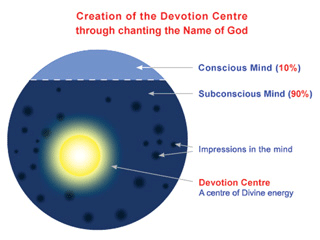

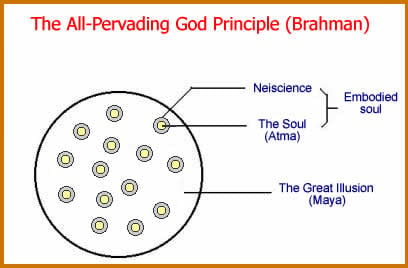
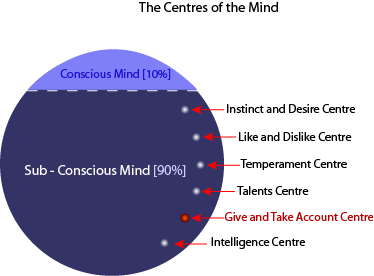
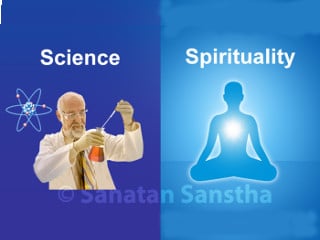 Physical sciences and the science of Spirituality
Physical sciences and the science of Spirituality Obstacles faced when studying Spirituality
Obstacles faced when studying Spirituality Importance of Spirituality
Importance of Spirituality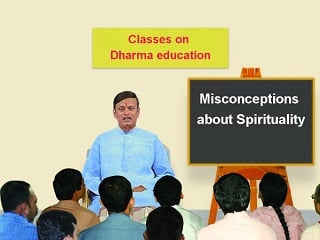 Misconceptions about Spiritual practice ( Sadhana )
Misconceptions about Spiritual practice ( Sadhana )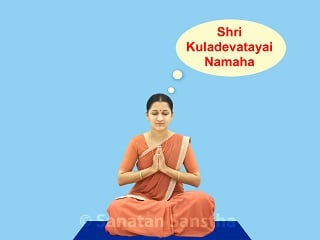 Qualities essential for Spiritual practice ( Sadhana )
Qualities essential for Spiritual practice ( Sadhana )